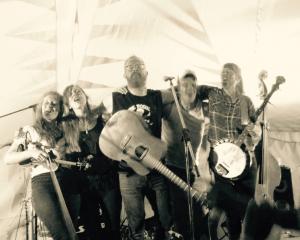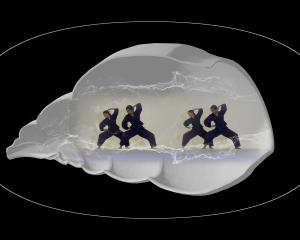>See her: Thursday at the Penguin Club, Oamaru; Friday at Circadian Rhythm, Dunedin; Saturday at Cinema Paradiso, Wanaka; Sunday at Dux De Lux, Queenstown.
The Girl/Saint/Sufferer, Lorazapam and Song for a Cruel German Psychiatrist Woman are not mere observational ditties.
Penned while Carafice was made a ward of the State and sent to a high-security mental institution in Auckland in 2003 because of fears for her safety, they speak from the heart.
"I'll fight my way out of this one . . . I'll find a window and be gone," Carafice sings on Asylum Escape Song which, not surprisingly, is about exiting said institution.
That Carafice managed to do so after just a week, and while still severely depressed, suggests she has an instinct for survival that contradicted any therapist's opinion she might commit suicide.
Carafice marked her 22nd birthday from a bed within that hospital - a time she describes as the lowest point in her life - then promptly faked her way out.
Motivated by talk among fellow patients of electro-shock therapy, she briefly stowed her cloak of depression, convinced the doctors she was fine and was cleared to leave.
However, it would be grossly inaccurate to claim Carafice has not looked back.
A long-time sufferer of depression, she still has "massive trust issues", she explains via cellphone from Auckland, where she has been for the past six weeks since returning for the first time from Chicago, her base for the past two and a-half years.
Carafice has the use of her nana's car while in Auckland and plans to take her elderly relative shopping later in the day.
In the meantime, she is more than happy to travel a road that includes her battles with mental illness and the role music has played in her recovery.
There is, of course, the subject of her new album and subsequent 15-date New Zealand tour, both of which give Carafice cause for celebration.
"It's about celebrating how I was able to get through that and putting it out there how I got through as proof so that other people can get through that.
"I wrote most of the songs from my hospital bed at Te Whetu Tawera as a way of dealing with what was going on.
But it also became a way of envisaging a way of life for myself that was beyond what I was experiencing.
Imagine if I wrote these songs and they got on the radio or TV and if I toured the whole country; imagine what that would be like - that became this driving purpose for me."
Tells You To Fight was released on New Zealand independent label Monkey Records.
Following the tour launch last Wednesday in Auckland and a support slot for United States act Band of Horses, she will visit southern venues next week, performing on a range of instruments, including keyboards and guitar.
Despite, or perhaps because of, its inspiration, Tells You To Fight is no highly amplified rant.
In the absence of anger lurks a quiet, assured defiance.
And though Carafice frames many of her songs in Dobro and piano, clanky, gothic tones that evoke a misty American South, there is plenty of vibrancy, too.
Then there's her voice: strong and fragile in equal measure, it doesn't so much float on top of the instruments as cut straight through, staking a claim for attention.
The 11 songs have been around for a while now, Carafice says.
A week after leaving hospital, she performed at a Goldenhorse show ("They are good friends of mine").
Despite, or again perhaps because of, the fact she collapsed during the performance, she made a "real impact".
''I was performing from the moment I was released and that was helping me deal with my well-esteem . . . I got a boyfriend and a house to live in and was doing well and my music was doing well."
Carafice continued to play live with her band Operation and, eight months after her hospital release, student radio station 95bfm featured her first single, Lorazapam, on its top-10 chart for four successive straight weeks.
She then toured New Zealand with United States acts Crooked Fingers and Micah P Hinson as well as opening for David Pajo.
"The turning point came almost a year later when I had this realisation . . . what I was hoping for the whole time was that someone would come and rescue me and get me out of this terrible life I was in.
I came to this realisation that I was the only one who could get my life together."
A year later, in 2005, Carafice won the Nescafé Big Break award.
With prizemoney of $25,000, she and producer Ben King, a member of Goldenhorse, contacted influential Chicago engineer Steve Albini, whose credits include the Pixies, Nirvana and PJ Harvey among numerous others who have booked time at his analogue recording studio Electrical Audio.
Engineered by Nick Abbott (Crowded House, Goldenhorse, Pluto) and mastered at Skye Mastering (Talk Talk, Madness) in Scotland, Tells You To Fight has a no-frills sound for which Albini is renowned.
"We were massive fans of what he had done, of his sound - and the space where a lot of these things had been recorded . . . When I sing, I'm not putting on a Mariah Carey voice. I'm not hiding what I'm trying to say either. I think that ties in well with just hitting `record' on the tape machine and recording how it sounds in the room. Also, those rooms sound so beautiful that it captures it the best it possibly could."
Key to the tonality of Carafice's album is her use of a Dobro guitar (those unfamiliar with the instrument may be able to recall the cover of the Dire Straits album Brothers In Arms which features a chrome model).
An acoustic instrument, its metal resonating chambers provide a unique clanky sound favoured by some blues and country artists.
"That guitar means a lot to me," Carafice says.
"It sounds old and cranky and beaten-up. I thought, `I'm never going to play anything else' [but] I had a pretty shabby situation when I first moved to Chicago. My fiancé was going to come over when I moved there but he bailed on me when I was over there so I had to sell that guitar."
Carafice says she was always going to be a musician.
Though she was raised in a non-musical family ("I was the only one to sing and play ukulele and things ..."), her parents have been supportive.
"I took a strange route. I didn't go to school pretty much my whole life. I was a Correspondence School kid. That's because even from an early age I was really weird with people. I didn't want to be around other kids. Then when I was 16 I did decide to go to school. I went to Onehunga High School and had the time of my life . . .I was playing assemblies and stuff.
"Because I have been alone most of my life, music is something that I do alone. I don't do it with other people. At the same time though, when I was 15 I joined an Andean traditional band and played with these Andean guys, playing all the traditional little guitar things. I did that for a little while."
She may deal in difficult themes, but music is not difficult for Carafice.
Songs arrive often.
"They pop into my head and they are made. I can hear all of the parts for all of the instruments. I just write it all down and it's done. Since I've been in Chicago I've written a whole album's worth of songs. It's fantastic. It's a wonderful process."
Carafice plans to head back to Chicago after her New Zealand tour.
She lives alone, far away from family.
She concedes they worry about her, though they need not.
"I function better when I am alone, in that there is no-one asking me how I'm doing and treating me like I'm sick. I'm able to almost act my way through life; then it becomes almost reality.
"I moved there without any connections except the musicians I'd recorded with, so it was a real leap of faith, but now I have a family of friends, a group of people who I've got really close with and they are my support network over there. I actually have a rap group in Chicago. It's unbelievable and it did start as a joke, but it's a reality now. I work with a really good rapper called Serengeti. We recorded an album together that is coming out there and we've done shows together."
Carafice agrees there is a mutually beneficial arrangement between music and mental state: The better she feels, the better the songs, and vice versa.
However, music is not the main prize.
"One thing that has been really hard for me when I've been unwell is people telling me, `This will make a great song'. You feel like smashing them in the face. Are you kidding me? I don't care about songs; I just want to live a happy life.
"The truth is, the music I made about those experiences is massively therapeutic in that it makes something beautiful out of something really ugly and also the vision, the goal behind the music, is one of the main things that kept me going.
"At the same time, it's not all of it. I've removed myself and tried to keep it a bit separate from the main goal of having a really comfortable, happy life . . . For me, living a normal life is success enough; it's more than I thought I was going to be able to do. My grand plans are to be able to save up and get a place in Chicago to live and to have a husband and kids and live a happy family life. That is the hugest thing I can think of."












